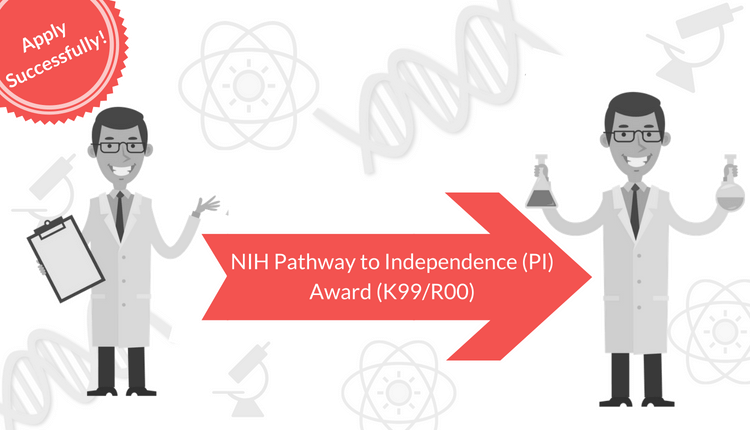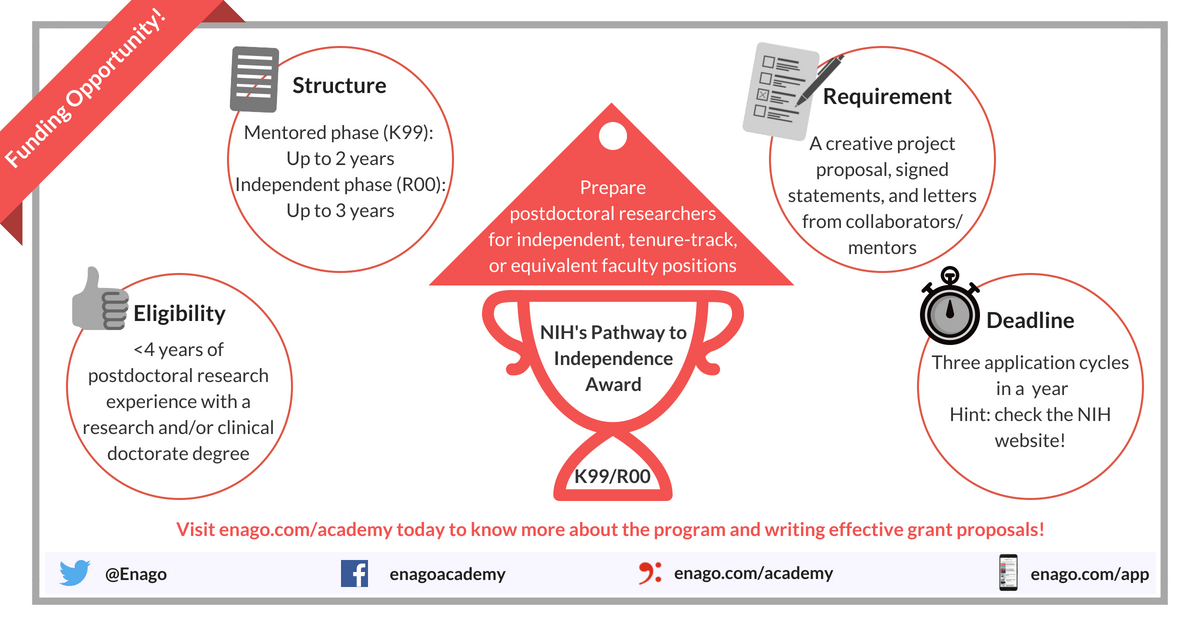The NIH Pathway to Independence Award (K99/R00): Did You Apply?

The National Institute of Health’s (NIH) Pathway to Independence (PI) K99/R00 program provides mentoring and support to budding postdoctoral researchers. The guidelines are institute-specific with few variations, including budget allocation for salary and research funds. For bioengineers, for instance, the research program is detailed on the National Institute of Biomedical Imaging and Bioengineering (NIBIB) website.
The program targets non-tenured applicants with less than 4 years of postdoctoral experience and commitment to an academic career.
Researchers who are not U.S. citizens or green card holders (permanent residents) are also eligible to apply for this award.
In general, the two-phase support structure includes:
- A mentored phase (K99): Mentored support for 1-2 years for highly promising postdoctoral researchers in the respective field of research.
- An independent phase (R00): Independent research support for up to 3 years after securing an independent research position with an internal administrative review.
The award system is deconstructed here to answer a few key questions:
- What is the Pathway to Independence Award Program?
- Am I eligible to apply?
- What are the requisite criteria for the application process?
- How can I learn more before I apply for the award?
- What are the next logical steps?
The Structure
- The program is designed to assist outstanding postdoctoral researchers achieve necessary mentored training to transition to independent research careers.
- Applicants are required to propose a well-conceived plan for 1-2 years of career development under the guidance of a mentor. The research training aims to enhance the competitiveness of the candidates for tenured faculty positions and launch their independent research careers thereafter.
- It is open to candidates who have excelled in their fields within the United States, regardless of the citizenship.
- The two-phase structure includes the K99 and R00 phases within the described timelines.
- The funding opportunity is open for the following categories based on the research context:
Am I Eligible?
In short, applicants must possess:
- Postdoctoral research experience of not more than 4 years
- Research productivity
- A creative project proposal for an independent research project
- Preliminary data
- A list of potential institutes identified within the US for tenure-track faculty positions
After affirming the above, determine the following:
- Check whether capable to spend at least 12 more months as a postdoc after the award
- Pursue research aligned with the mission of the NIH
- Pursue a tenure-track faculty position within the US
- Discuss research proposal structure with colleagues
- Reach out to area-specific NIH contacts for advice
Thereafter, decide on the following factors to prepare for program’s next phase:
- Clearly distinguish the relationship between your research and the mentor’s research
- Describe how independence will be gained from the proposed mentor
- Obtain a statement of support for the K99 mentored phase from the proposed mentor
- Describe the research transition to R00
- Form a robust career development plan
Key Requirements
- The research proposal forms the largest chunk of your research strategy, spanning both phases (K99/R00) of the award.
- The proposal constitutes 12-pages in maximum, excluding 1-page of aims and other details.
- Separate deadlines specific to new applications, resubmissions, and start dates.

Further Information
- Candidates are directed to links from the NIH officials and from peers for further information about the award.
- Key information on the reissued PA-16-193 solicitation and writing a K99/R00.
Next Steps
- Candidates should review the entire NIH solicitation beforehand.
- Draw up a rough plan.
- Brainstorm your approach – include strengths, weaknesses, opportunities, and challenges.
- Request proposal review(s) two weeks prior to the deadline from your proposed institute.
Have you applied or planning to apply for this program? Share your experiences with us in the comments section below.









